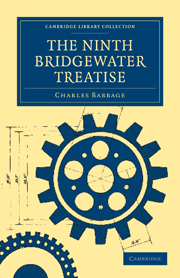Book contents
- Frontmatter
- Contents
- Preface
- Title in the Series
- CHAPTER I Nature of the Argument
- CHAPTER II Argument in favour of Design from the changing of Laws in Natural Events
- CHAPTER III Argument to show that the Doctrines in the preceding Chapter do not lead to Fatalism
- CHAPTER IV On the Account of the Creation, in the First Chapter of Genesis
- CHAPTER V Further View of the same Subject
- CHAPTER VI Of the Desire of Immortality
- CHAPTER VII On Time
- CHAPTER VIII Argument from Laws intermitting—on the Nature of Miracles
- CHAPTER IX On the permanent Impression of our Words and Actions on the Globe we inhabit
- CHAPTER X On Hume's Argument against Miracles
- CHAPTER XI À priori Argument in favour of the Occurrence of Miracles
- CHAPTER XII Thoughts on the Nature of Future Punishments
- CHAPTER XIII Reflections on Free Will
- CHAPTER XIV Thoughts on the Origin of Evil
- CONCLUSION
- APPENDIX
- CORRECTIONS
CHAPTER II - Argument in favour of Design from the changing of Laws in Natural Events
Published online by Cambridge University Press: 05 October 2010
- Frontmatter
- Contents
- Preface
- Title in the Series
- CHAPTER I Nature of the Argument
- CHAPTER II Argument in favour of Design from the changing of Laws in Natural Events
- CHAPTER III Argument to show that the Doctrines in the preceding Chapter do not lead to Fatalism
- CHAPTER IV On the Account of the Creation, in the First Chapter of Genesis
- CHAPTER V Further View of the same Subject
- CHAPTER VI Of the Desire of Immortality
- CHAPTER VII On Time
- CHAPTER VIII Argument from Laws intermitting—on the Nature of Miracles
- CHAPTER IX On the permanent Impression of our Words and Actions on the Globe we inhabit
- CHAPTER X On Hume's Argument against Miracles
- CHAPTER XI À priori Argument in favour of the Occurrence of Miracles
- CHAPTER XII Thoughts on the Nature of Future Punishments
- CHAPTER XIII Reflections on Free Will
- CHAPTER XIV Thoughts on the Origin of Evil
- CONCLUSION
- APPENDIX
- CORRECTIONS
Summary
The estimate we form of the intellectual capacity of our race, is founded on an examination of those productions which have resulted from the loftiest flights of individual genius, or from the accumulated labours of generations of men, by whose long-continued exertions a body of science has been raised up, surpassing in its extent the creative powers of any individual, and demanding for its development a length of time, to which no single life extends.
The estimate we form of the Creator of the visible world rests ultimately on the same foundation. Conscious that we each of us employ, in our own productions, means intended to accomplish the objects at which we aim, and tracing throughout the actions and inventions of our fellow-creatures the same intention,—judging also, of their capacity by the fit selection they make of the means by which they work, we are irresistibly led, when we contemplate the natural world, to attempt to trace each existing fact presented to our senses to some precontrived arrangement, itself perhaps the consequence of a yet more general law; and where the most powerful aids by which we can assist our limited faculties fail in enabling us to detect such connexions, we still, and not the less, believe that a more extended inquiry, or higher powers, would enable us to discover them.
The larger the number of consequences resulting from any law, and the more they are foreseen, the greater the knowledge and intelligence we ascribe to the being by which it was ordained.
- Type
- Chapter
- Information
- The Ninth Bridgewater Treatise , pp. 30 - 49Publisher: Cambridge University PressPrint publication year: 2009First published in: 1837



